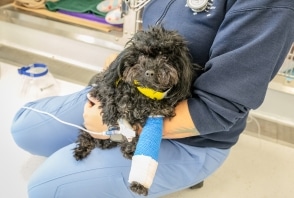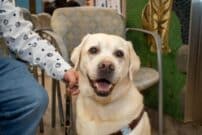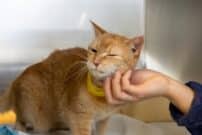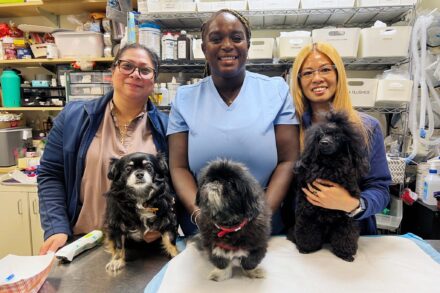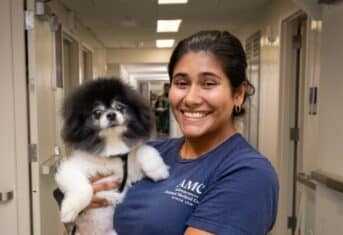Hemangiosarcoma: A Common Tumor of the Spleen

Hemangiosarcoma: A Common Tumor of the Spleen
The Animal Medical Center’s ER struggled to save Walker last week. Walker was an apparently healthy, 10-year-old German shepherd. He collapsed at home and was rushed to the ER. Examination by the ER staff was quickly focused on a triad of abnormalities – anemia, abdominal distension and shock. These findings immediately suggested internal hemorrhage from a tumor of the spleen common to German shepherds called hemangiosarcoma.
Hemangiosarcoma is a tumor arising from blood vessels. Unlike lymphoma, which is common in both humans and pets, hemangiosarcoma is not a human cancer. Walker’s tumor developed in his spleen, but the right side of the heart and skin are other common locations for hemangiosarcoma in the dog. Occasionally it develops in an unusual location like the eye, prostate, bone, retroperitoneal space (an area outside the abdomen but inside the body, near the kidneys). Almost any breed of dog can develop hemangiosarcoma. Most large breed dogs are at risk for this deadly tumor, including German shepherds like Walker, Golden retrievers, Labrador retrievers and schnauzers. Cats are affected by hemangiosarcoma, but it typically occurs in the skin and rarely occurs in the spleen. For those with large animals in their lives, horses and sheep also develop hemangiosarcoma.
The acute collapse Walker’s owner observed is a common sign of hemangiosarcoma. The tumor bleeds easily resulting in anemia and weakness. Sometimes, if the bleeding is only slight, the signs are more subtle – weakness followed by normal energy or difficulty jumping into the car or onto the sofa. If hemangiosarcoma occurs in the heart, it may block the heart from pumping blood, causing collapse.
Veterinarians do not know what causes hemangiosarcoma. Because we don’t know what causes it, we can only treat the tumor, not prevent its occurrence. The emergency surgeon often handles the first part of treatment, splenectomy.
The spleen is removed to stop the internal hemorrhage and also test the spleen for malignancy. Similarly skin tumors can be removed with surgery, but tumors of the right side of the heart are not so easily removed. In some cases, treatment stops there, but in other cases, dog or cat owners elect follow-up chemotherapy. Chemotherapy has been shown to prolong survival compared to dogs treated with surgery alone, but virtually all dogs relapse.
Walker’s family wanted to give him every chance and he has just gotten his first treatment. I am happy to report he has had no reaction and we will keep our fingers crossed.
Some of you may be wondering what the impact of removal of the spleen will have on Walker. I’ll address your question in my next post.
________________________________________________________
This may also be found in the “Tales from the Pet Clinic” blog on WebMD.com.
For over a century, The Animal Medical Center has been a national leader in animal health care, known for its expertise, innovation and success in providing routine, specialty and emergency medical care for companion animals. Thanks in part to the enduring generosity of donors, The AMC is also known for its outstanding teaching, research and compassionate community funds. Please help us to continue these efforts. Send your contribution to: The Animal Medical Center, 510 East 62nd Street, New York, NY 10065. For more information, visit www.amcny.org. To make an appointment, please call 212.838.7053.



